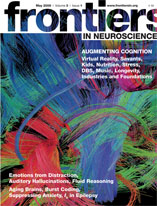
“Intact brain processing of musical emotions in autism spectrum disorder, but more cognitive load and arousal in happy vs. sad music.”
Frontiers in Neuroscience, July 2014 15:8
Gebauer L., Skewes J., Westphael G., Heaton P., Vuust P.
Abstract:
Music is a potent source for eliciting emotions, but not everybody experience emotions in the same way. Individuals with autism spectrum disorder (ASD) show difficulties with social and emotional cognition. Impairments in emotion recognition are widely studied in ASD, and have been associated with atypical brain activation in response to emotional expressions in faces and speech. Whether these impairments and atypical brain responses generalize to other domains, such as emotional processing of music, is less clear. Using functional magnetic resonance imaging, we investigated neural correlates of emotion recognition in music in high-functioning adults with ASD and neurotypical adults. Both groups engaged similar neural networks during processing of emotional music, and individuals with ASD rated emotional music comparable to the group of neurotypical individuals. However, in the ASD group, increased activity in response to happy compared to sad music was observed in dorsolateral prefrontal regions and in the rolandic operculum/insula, and we propose that this reflects increased cognitive processing and physiological arousal in response to emotional musical stimuli in this group.